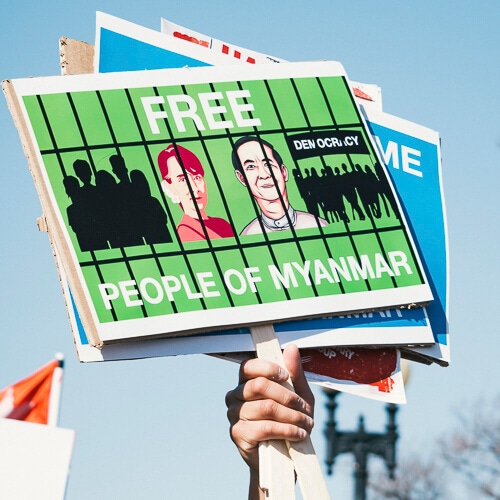Myanmar bans telco execs from leaving country
Myanmar turns up pressure on telcos to install spyware, with a July 5 deadline. Norway's Telenor looks to exit; Qatar's Ooredoo is a possible buyer.

Myanmar's military junta has told senior telco executives they must seek special permission to leave the country.
The move appears designed to increase pressure on the companies to install technology allowing the government to spy on and track users.
"Junta holding them hostage as they pressure telecoms firms to finalise activation of intercept tech," tweets Justice for Myanmar, an activist group which is opposed to the military government.
Figure 1:  (Source: Gayatri Malhotra on Unsplash)
(Source: Gayatri Malhotra on Unsplash)
Telecom companies have been given until July 5 to activate intercept spyware which lets the military government eavesdrop on calls, read text messages, emails and other web traffic, and track users' locations.
The news comes as Norway's Telenor looks increasingly poised to exit Myanmar.
Telenor is exploring routes to selling its business there, with the investment bank Citigroup currently gathering non-binding bids on its behalf.
Qatar's Ooredoo has been mentioned as a possible candidate for buying its competitor.
"For context, if Telenor leaves, that leaves Ooredoo as the only non-military controlled teleco in Myanmar," said Burmese-American journalist Aye Min Thant on Twitter.
Telenot staying
Telenor has been in the country since 2014, where it has 18 million customers.
But it has seen its subscription and traffic revenues halved by the military government's restrictions on networks and shutdown of mobile data.
The month following the coup, Telenor announced it would pay its annual license fee but "under strong protest," calling for the immediate opening of the data network.
Senior foreign telco executives told they cannot leave #Myanmar without junta's permission. Junta holding them hostage as they pressure telecoms firms to finalise activation of intercept tech to spy on calls, messages and web traffic and to track users https://t.co/t6sU9trMPE pic.twitter.com/0LIpcY2j3q
— Justice For Myanmar (@JusticeMyanmar) July 5, 2021
In May, its CEO Sigve Brekke said the company, which is 54% owned by Norway's government, could still "make a difference" by taking such steps, as public opposition to a new security law grew.
At the same time, Brekke admitted the country's human rights and security situation showed "limited prospects of improvement."
That month, the company took the step of writing off its entire 6.5 billion Norwegian krone (US$782 million) investment as a first-quarter loss.
This caused it to have a 3.9 billion krone ($454.3 million) loss for the first quarter of 2021, compared with a profit of 698 million krone ($81.3 million) in the same quarter a year before.
No sir Norway
Besides Telenor, Myanmar's operators include two under the control of the military government.
MPT is a large state-backed operator, and Mytel is a joint venture between the country's army and Vietnam's defense ministry-owned Viettel.
The digital rights group Free Expression Myanmar has suggested the military may instead grant operating licenses as gifts to Chinese and Russian-linked telcos.
Following the February 1 coup, when the country's military deposed Aung San Suu Kyi from office after five years, the military government used smartphone data as evidence for mass arrests of its opponents, detaining over 6,000 people.
For context, if @Telenor_mm leaves, that leaves @ooredoo_mm as the only non-military controlled teleco in Myanmar. This is especially alarming as the junta is now actively monitoring the phone and internet activities of people in Myanmar. #WhatsHappeningInMyanmar https://t.co/cxoPYffMxU
— Aye Min Thant (@the_ayeminthant) July 2, 2021
The junta, led by General Min Aung Hlaing, also arrested Suu Kyi and declared the November 2020 general elections invalid, which her party won.
Min Aung Hlaing's government then responded to the protests which followed by shutting down the Internet and blocking Twitter, Facebook, WhatsApp, Instagram and VPNs.
It emerged that ex-military officials in the Ministry of Transport and Communications and Ministry of Home Affairs had ordered telecommunications firms to install spyware even in the months leading up to the coup.
The message was reiterated, along with the July 5 deadline, in a letter sent to telecommunications companies in late June, reports Reuters.
The letter arrived a week after the order, which told the companies their senior executives could not leave Myanmar without permission.
Burmese days
Outside the telecommunications sector, Japan's Kirin brewery and South Korea's Posco shipbuilder have pulled out of joint ventures with military-linked partners.
France's Total and America's Chevron, which invest in the country's Yadana offshore gas field, have rejected calls to withhold tax payments to the military, saying doing so would put their local staff in danger.
Want to know more about security? Check out our dedicated security channel here on Light Reading.
Meanwhile, UN Special Rapporteur Clement Voule told the Human Rights Council in Geneva last week that Internet and mobile phone shutdowns are now "lasting longer" and "becoming harder to detect."
Authoritarian governments around the world are getting better at "throttling" bandwidth in particular areas to keep protestors from communicating with each other before or during demonstrations, says Voule.
From January 2019 to May 2021, there were 79 incidents of protest-related mobile and Internet shutdowns internationally, he says, including during elections in Benin, Belarus, the Democratic Republic of Congo, Malawi, Uganda and Kazakhstan.
Related posts:
— Pádraig Belton, contributing editor special to Light Reading
Read more about:
AsiaAbout the Author(s)
You May Also Like












